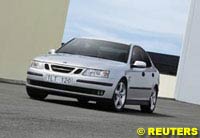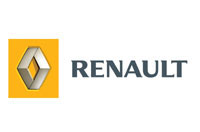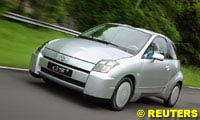

Automotive News and Reviews for the Petrolhead
In this week's issue:
- Car Briefs
- Cost Conundrum Holds Up Diesel Hybrid Cars
- Proton in Tie-Up Talks with VW
To publicise the rebranding of Daewoo as Chevrolet on 1 January 2005, buyers are being made an unusual offer. Buy a new Daewoo between now and 15 November and it will be exchanged with a new equivalent-model Chevrolet in six months time.
The offer is available on a selection of cars from the Daewoo range, apart from Matiz and Nubira, with an option to upgrade when ordering the exchange vehicle. For example, the customer's particular derivative or colour choice may not be immediately available on the Daewoo. Colour change or a derivative upgrade, even to a different model in the Chevrolet range, is possible - on a derivative or model upgrade the customer will simply pay the difference.
The frontal offset test simulates a real head-on collision. In real-life, cars almost never crash absolutely head-on because one or both will try and take evasive action, meaning the two cars are slightly offset at the point of impact. In the side impact test, the car is struck by a 3,300 lb (1500kg) moving barrier, shaped to simulate an American Sport Utility vehicle (e.g. off-roader or pick-up).
These top US scores come after the 9-3 had already earned a five star rating from Euro-NCAP.
This is the ninth version of the logo in the 106 year history of Renault, so it is likely to be around for the next 10 years or so. Renault is trying to position itself as stylish, design-led but affordable - hence its Créateur d'Automobiles slogan. All volume car companies are trying to create an identity that sets them apart but, so far, Renault appears to be one of the most successful.
Toyota has a startling target of producing 20 million tonnes of bio-plastics annually, derived from sweet potatoes grown by a Toyota subsidiary in Indonesia. Even Toyota doesn't need that much plastic, but will use it increasingly in its own cars and also sell the material on the open market. Already the Japanese-market Raum (see what we mean about strange names?) uses bio-plastic floor mats.
As part of its environmental programme, Toyota has also established businesses that are planting new forests in Australia, promoting roof gardens in Japan's urban centres, excavating peat in China and exploring the potential of a high-yield strain of rice in Vietnam. Of course, within the car industry, Toyota is now the world leader in petrol electric hybrids which do have some environmental advantages.
A car that can go 80 miles on a gallon of renewable fuel such as soy and canola would seem like an ideal solution to oil prices bumping around historic highs of $50 a barrel. In fact, the technology already exists in the form of so-called diesel hybrid vehicles, which yoke a conventional diesel engine to an electric motor and battery to store unused energy for clean and quiet driving at lower speeds.
But automakers say such cars are unlikely to move out of the research lab any time soon, even as fuel efficiency becomes a must for more and more customers appalled by prices at the pump. The main problem is that diesel hybrid cars cost too much to produce -- thousands of dollars more than petrol-electric hybrids like Toyota's Prius, which is a sell-out US hit.
"Diesel hybrid is one possible propulsion system that we are researching and testing, but no one can say whether this is the path to the future," said Edith Meissner, a spokeswoman for German-American carmaker DaimlerChrysler.
"It is certainly the most efficient method among the conventional powertrains ... but also the most expensive."
Standard diesel engines burn less fuel than petrol engines. Hybrid technology makes them even more frugal by letting cars run on stored electricity captured during braking and coasting.
But this lands a double whammy on costs. A diesel engine typically costs around 10 percent more than its petrol-driven cousin of similar power, even without the cost of adding an electric motor, batteries and the electronics to run them.
A Toyota diesel hybrid truck that went on sale in November 2003, for instance, costs around $10,000 more than its diesel-only version, a third more. Whether consumers are ready to pay that kind of premium for super-efficient cars remains open. Toyota doesn't produce a passenger-car version of the diesel hybrid.
Better than Fuel Cells?
A Bernstein Research study estimated that hybrid cars able to go 20 miles on electric power alone would still cost 20 percent more than conventional cars, even if manufacturing volumes rose to 100,000 a year by 2010. Fuel savings would recoup the price premium only after 300,000 miles -- more than twice most cars' life expectancy.
Toyota, the Japanese carmaker that made petrol-electric hybrids a real hit, questions whether it is viable, practical or sensible to sell diesel hybrid passenger vehicles in the foreseeable future.
"Before adding a hybrid system to a diesel engine, we still think there's room for improvement in the diesel-only and gasoline-only engines in terms of fuel efficiency," a Toyota spokesman said.
Honda, another force in hybrids, also played up the costs and played down the prospects of launching serial production of a diesel hybrid car. General Motors, Ford and DaimlerChrysler all came up with fuel-sipping diesel hybrids in the 1990s under the U.S. government-backed Partnership for a New Generation of Vehicles, but never marketed them.
Still, some researchers think diesel hybrids could hold their own even against highly touted hydrogen fuel cells -- widely seen as a candidate for powering a big portion of future cars, but which would need a huge energy infrastructure overhaul.
A study by the Massachusetts Institute of Technology's Laboratory for Energy and the Environment found that even with aggressive research, fuel-cell cars won't beat diesel hybrids on total energy use or greenhouse gas emissions by 2020. It concluded that intense research on a diesel-engine hybrid could produce by 2020 a vehicle that is twice as efficient and half as polluting as fuel-cell cars including the emissions and energy used to deliver the fuel and make the vehicle.
Many carmakers are pressing on.
"It is more difficult to hybridise diesel, but we are going to show that it is possible," Jean-Martin Folz, chief executive of Europe's number-two carmaker PSA Peugeot Citroen, told an industry conference in Frankfurt last month.
A spokesman said PSA was working with two British firms to develop a diesel hybrid version of the Citroen Berlingo car, but had not yet decided whether to make it commercially. Volkswagen will enter an experimental diesel hybrid car at the Michelin Challenge Bibendum in Shanghai next month, a contest for alternative powertrain vehicles.
"The technology is there and has been well known for years. The problem with hybrid is the battery technology," a VW spokesman said, noting no one yet has come up with a hybrid battery that lasts as long as the car it powers.
Volkswagen is in talks with Malaysian auto company Proton for a partnership that could give the German manufacturer a foothold in Southeast Asia's fast-growing auto market.
"We're talking with Proton about the possibilities of a cooperation," a spokesman for Volkswagen in Germany said, declining to provide further details.
Last week, the Asian Wall Street Journal reported the two were negotiating citing unnamed sources, but it was not clear whether a prospective deal would involve VW taking a significant stake in Proton -- which has nearly half of the Malaysian market.
A tie-up could give Volkswagen access to Proton's extensive production capacity, which could be used to make cars for sale in Southeast Asian countries, it said. Proton officials could not be immediately reached for comment.
Proton, one of Malaysia's two car makers, said on Wednesday it would tie up with a foreign firm by the year-end as it prepared to compete in a market that was opening up under regional trade rules. Chief Executive Tengku Mahaleel Tengku Ariff said Proton was in discussions with two foreign car makers, but he declined to name the firms or state the nature of any proposed tie-up.
Malaysia's government, committed to reducing tariffs to between zero and 5 percent by next year under the ASEAN Free Trade Agreement, has encouraged Proton to find a strategic partner, saying it should not depend on handouts. AFTA covers Brunei, Cambodia, Indonesia, Laos, Malaysia, Myanmar, the Philippines, Singapore, Thailand and Vietnam.
![]() Car Briefs
Car Briefs
 The US Insurance Institute for Highway Safety (IIHS) has awarded the Saab 9-3 the title of "Best Pick" for both frontal offset and side impacts after a series of crash tests.
The US Insurance Institute for Highway Safety (IIHS) has awarded the Saab 9-3 the title of "Best Pick" for both frontal offset and side impacts after a series of crash tests.
 Renault is revising its diamond logo and accompanying typeface. The new design is intended to be more contemporary and more, well, "designer".
Renault is revising its diamond logo and accompanying typeface. The new design is intended to be more contemporary and more, well, "designer".
 Not a bizarre new name (although the country that gave us the Mazda Bongo Friendee would be quite capable of coming up with such a moniker), but a new way of making car plastics.
Not a bizarre new name (although the country that gave us the Mazda Bongo Friendee would be quite capable of coming up with such a moniker), but a new way of making car plastics.
![]() Costs Holds Up Diesel Hybrid Cars
Costs Holds Up Diesel Hybrid Cars
![]() Proton in Tie-Up Talks with VW
Proton in Tie-Up Talks with VW
| Contact the Editor |
© 2007 autosport.com . This service is provided under the Atlas F1 terms and conditions.
|
Volume 10, Issue 40
Articles
Interview with Giancarlo Fisichella
Sayonara Oli
2004 Japanese GP Preview
2004 Japanese GP Preview
Japanese GP Facts & Stats
Columns
The F1 Trivia Quiz
Bookworm Critique
On the Road
Elsewhere in Racing
The Weekly Grapevine
> Homepage |